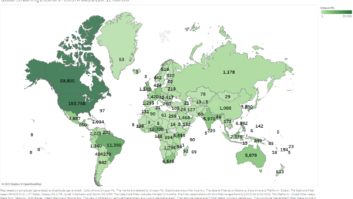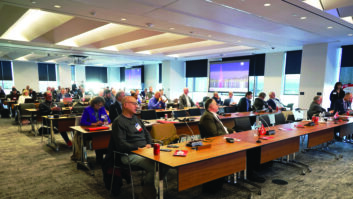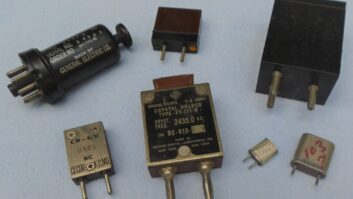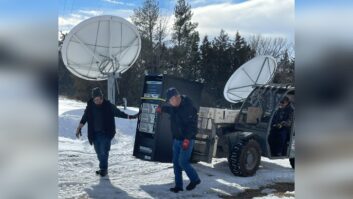Officials Hope Much-Delayed Launch Will End Talk of ‘Discontent Depot’
Public radio’s long winter of discontent may soon be over, as the much-delayed ContentDepot distribution system begins full-time operation this month.
A 90-day dual operations period, during which ContentDepot and the “legacy” single-carrier-per-channel satellite distribution system will both be available for station use, is projected to run through September, according to Public Radio Satellite System officials. At that time, the existing system will be retired. The project is almost two years late, based on the original target of fall 2004.
ContentDepot promises to simplify operations for more than 400 satellite-interconnected stations, make program distribution more reliable and improve tracking and reporting of program carriage for producers.
Prerecorded programs will be sent through the system as segmented files, making automated operation much easier, while live programs will be distributed as digital audio streams with embedded cuing data. A station need only sign up for a desired program on the ContentDepot’s Portal Web site to ensure it is delivered to the station’s receivers by the intended airtime.
With these potential benefits, however, comes significant change. The distributed network of uplink stations that previously provided programming from around the country was taken out of service on May 15, when the PRSS centralized uplink origination in Washington and reallocated satellite channels to free up satellite transponder capacity for the new system.
Many noncommercial radio producers had been taking a crash course in file-based program production and uploading in the months before the satellite change, and stations have been busily integrating IP-based audio “appliances” into their operations since they received their equipment shipments in April and May.
For smaller stations, the change will be most dramatic. Many of them are getting their first experience with an automation system and learning the nuts and bolts of computer networking at the same time.
Since ContentDepot treats program segments as individual audio files, for 120 stations without an existing automation system, PRSS provided a basic ENCO Systems workstation to allow them to import the segments and reassemble the program from its constituent parts.
Complex System
Conceptually, the ContentDepot system is fairly straightforward. A central database stores audio files and program metadata, which are scheduled based on station needs and distributed through an IP-based DVB satellite link to edge servers and audio decoders located at station sites for storage or live playout.
However, the reality of building out this simple concept in order to make it work well for all users has been a significant challenge. The sheer volume and variety of programs, station formats, schedule data and program metadata, along with a tremendous range in resources and expertise among producers and stations, led system planners to design fairly complicated software to manage the distribution backend.
Originally scheduled for a fall 2004 rollout to replace the existing single-carrier-per-channel satellite distribution system operated on behalf of public radio stations, the complex project ran into numerous snags that forced Public Radio Satellite System managers to revise the timetable several times.
PRSS officials had an opportunity to review ContentDepot’s development and offer a preview of system operations to station representatives assembled for the annual Public Radio Engineering Conference, held in Las Vegas just before NAB2006.
The most significant of the delays, said PRSS Director of Technology Marty Bloss, occurred when Siemens Business Systems acquired project integrator BBC Technologies midway through the development of key system software. This forced a six-month work stoppage until Siemens and PRSS were able to resolve project management and contract issues related to the acquisition.
Another significant delay occurred when an early version of Siemens’ completed system software did not meet specified performance criteria during user acceptance testing and substantial portions of the code had to be rewritten, according to Bloss.
Releasing that version of the software would have severely limited the usability of the system and was simply not an option. “We had to get it right,” Bloss said.
Stepping into the portal
In the weeks after PREC, the rollout progressed according to schedule. Interconnected stations had received equipment packages by the first week of May, and many engineers reported that they had completed installation of the equipment on the same day that they received it.
PRSS began sending test audio streams and sample files through the system on May 15 to allow stations to test connectivity and configure their automation systems to automatically import ContentDepot files. System planners had worked with a number of the larger automation vendors to ensure that stations’ existing systems would be able to import ContentDepot audio and metadata.
Now stations face the challenging task of putting the new system into use. Throughout the transition period, engineers and operations staff will be tweaking their automation systems, record schedules and getting familiar with the new ContentDepot Portal.
The Portal is the Web-based user interface for the new system, allowing station personnel to manage their program schedule, audition new programs and control how program-related information and alerts are communicated to operations staff.
The Portal also replaces the ContentDepot Catalog, a Web-only directory of file-based public radio programs that allowed stations and producers to get a feel for managing program distribution through an online interface. Producers will now use the Portal to upload and assign rights windows for their programs.
Producers can choose to distribute their programs as either live streams or files, depending on the timeliness of the content and production requirements. Some producers may elect to provide programs in both ways to simplify station operations and to minimize the expense and coordination headaches of offering re-feeds of live programs that may be broadcast later on some stations.
Behind the scenes, the ContentDepot software handles scheduling for both live streams and file transfers, balancing producers’ program feed schedules with the requirements of stations’ air schedules and optimizing the flow of data through the DVB channel.
Where’s the SOSS?
As difficult as it is to make changes to a key part of their stations’ operations, most public radio engineers agree that they’re all too happy to put the existing Satellite Operating Support System behind them. IBM developed SOSS for the existing satellite system rollout in 1995 and built it on that company’s now-discontinued OS/2 operating system, forcing stations to support aging PC hardware and making networking and data integration with stations’ primarily Windows-based automation systems impossible without custom software.
PRSS officials admit that some limitations of the first version of ContentDepot system software will cause some operational headaches at stations, notably the inability to tune receivers to a program already in progress and the requirement that stations subscribe to each individual hour of each program, but they assert that the benefits of the new system as compared to SOSS will be a dramatic improvement for users.
Improvements to the software are slated for a “ContentDepot 2.0” release to be scheduled when this summer’s dual operations period is complete.
Although the development delays, missing features in the software and quirks of the receiver hardware prompted some wags to dub the system “Discontent Depot,” the public engineering community generally has been supportive of PRSS’ efforts to get the system built and fully tested, based on many posts about the topic on Pubtech, a listserv for public radio engineers.
All are now hoping that, as the Duke of Gloucester once observed on his way to becoming Richard III, a discontented winter makes way for a glorious summer.












